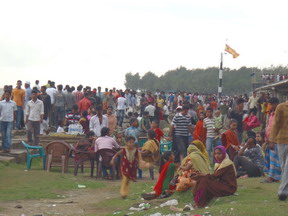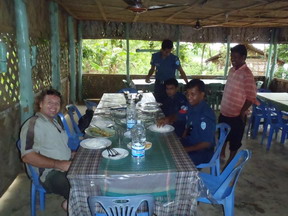Dhaka to Chittagong Division, Cox’s Bazaar and back - Sun 27 June –Tues 13 July 2010
Sadly (as is old news now!) our good wishes were of no use and once more England failed to shine in the World Cup. We at first found it all a bit weird the huge enthusiasm here for the football teams of countries where most Bangladeshis will probably never visit - but perhaps on reflection choosing a team which might have a hope in hell of getting somewhere even if you have no connection to their country might be the way to go! Anyway putting it all behind us we headed next morning to Mobil Oil's head office in Gulshan. We have put more about Mobil Oil, one of our sponsors, on our front page but we were really honoured that they'd made such an effort having a full presentation to hand over our oil and giving us a delicious lunch to boot thanks guys.
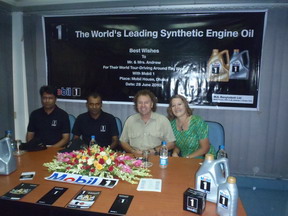 | 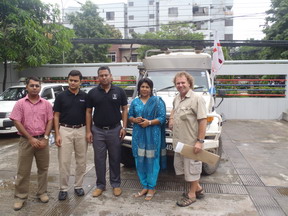 |
Finally just prior to leaving Dhaka we headed once more to the Immigration and Passport Office. As you may recall we have already done this twice in an attempt to get our 1 month visa extended 2 more months. First they stuffed it up by taking our 20,000 odd taka but only giving us 7 days -i.e. less than we still had outstanding on our visa. After police checks and meeting with the Director it was admitted than a mistake had been made, as this rule (7 days only) didn't apply to tourist visas which can be extended to 3 months. The guy who helped us gave us his card for future use and told us there was no need to return until the end of June. This was what we were doing planning to leave that afternoon - when some stupid woman went back to where we started and said we could only have 7 days. Of course at this point we couldn't get through to the "helpful guy" on the phone and we were told he'd transferred departments!! By the time we had once more waited hours to be ushered up to Director level and established we were right -it was too late to get our documents stamped so we had to delay and come back the next morning. Not happy!! We had to pay more for this visa than any other we've had so far, and it seems ludicrous to have to fight tooth and nail to stay in the country as tourists and spend money. As mentioned previously we have been travelling the country "visa less" for 2 months and when I expressed concern I was reassured that any problems (i.e.) if our visa status was checked en route - would be solved with a phone call to our contact. Since this guy has now left the department and is not contactable we are told, we can only thank God that the situation never arose! Time to lift your game Passport and Immigration Office!
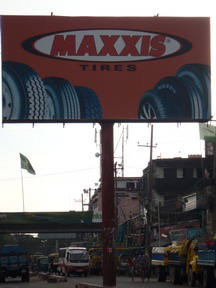
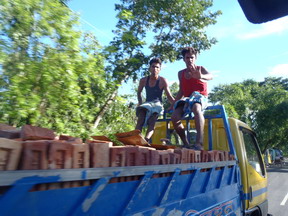
On a happier note our delay was a good thing as we met an interesting guy Dipu later that day. Dipu is a scout leader who is planning to drive from Bangladesh to Sweden next year to attend the Scout jamboree there. We had an interesting chat with him about our journey so far and he was kind enough to treat us to a delicious meal that evening.
Talking of delicious meals we also caught up with Morshed a journalist who we'd been talking to. We had a great meal at his house and met his charming wife Nelly and his Scottish friend Ali, who was a fellow overlander having driven with his wife from Scotland to Bangladesh a few years ago. With all these new friends we're starting to feel almost "at home" in Dhaka these days but on Thursday 1 July - with our visa extensions safely in our passports thank God!!- we headed on to our next destination Bangladesh's second city of Chittagong.
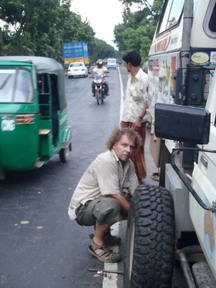
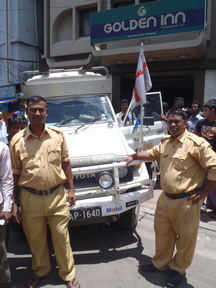
The Dhaka to Chittagong Highway has to be the scariest road to drive on the planet. It's not the road condition - this is really surprisingly good - it's the other drivers or really just the bus drivers. They hurtle down the road with no consideration for other road users and routinely try to force you off your own side of the road - it's crazy. Our terror was further impounded when we had a puncture - on the driver's side which had to be changed on the road edge as trucks thundered by. For once we were grateful to be objects of such fascination as the huge crowd that gathered around us at least slowed the trucks down a bit and we got the wheel changed without becoming road kill!
The rest of the drive was uneventful and we got to Chittagong as night fell and found a friendly little hotel -The Golden Inn - which whilst it didn't have a car park as such had a forecourt with 2 whistle welding security men managing it who guarded the car 24 hours in exchange for a little baksheesh. The famous B word has become very familiar to our ears in the months we've been here. Variously meaning a gift, tip or bribe it is very much part of the culture here that those who are rich (us ….so they think) should spread it around to those less fortunate. At least baksheesh expectations in Chittagong seem to be lower than those in Dhaka
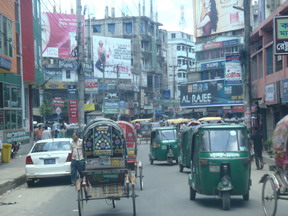 | 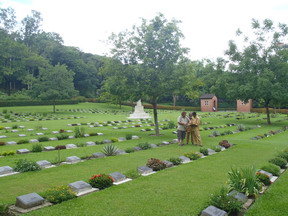 |
Next day we headed off, dodging the intermittent showers, the rainy season still being here with a vengeance to see some of the sights of Chittagong. At just 4 million people it's less than a 1/3rd of the size of Dhaka but it can still hold its own on the traffic jam front! As a major port there is a lot of constant activity. As with Dhaka the old city around the waterfront is a jumble of old chaotic alleys and the newer shopping areas and business districts are more clean and spacious with all the top shops and restaurants.
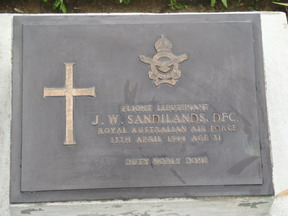 | 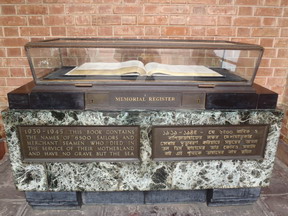 |
We headed first to the World War II Memorial which was attractively set in an incredibly well maintained garden. The dead are mainly English RAF, but there were also a mixture of nationalities including a few Australians, Africans, Burmese and even a separate mass grave for 19 Japanese. It reminded us of the war cemetery we saw at the River Kwai in Thailand, very moving and very sad so many of the dead were so young - the majority under 30. The cemetery is maintained by the Commonwealth War Graves Commission and there was a beautifully kept record naming all the dead.
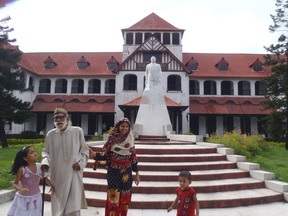 | 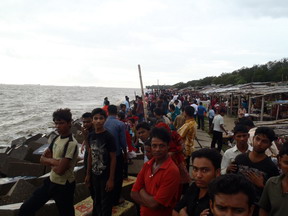 |
Next we headed to a memorial from a different war - the Zia Memorial Museum - paying tribute to President Zia who paid a very important role in the 1971 war of independence here. It was a curious building to find here, a sort of mock Tudor mansion which would have been more at home in the UK. It reminded us of the Osmani museum in Sylhet - exhibits included the President's immaculately maintained clothes, his soap and Old Spice! You could see the stairs where Zia was shot by an assassin and the blood stains on the stairs where he "rolled around up till death." The transmitter from which Zia publicly proclaimed the country's independence was also on display. Next we took in the Ethnological Museum which had some interesting information about local tribal people.
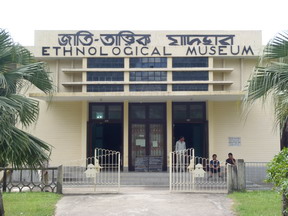 | 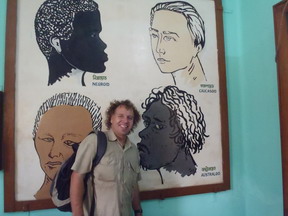 |
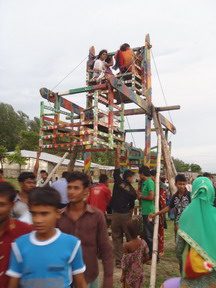
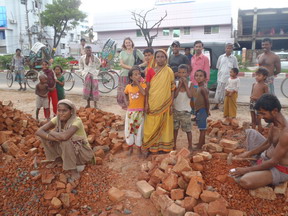
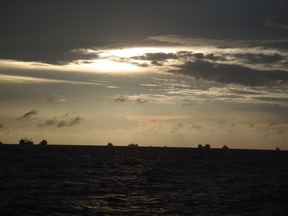 |
|
It was Friday the equivalent of Sunday here -and we next headed out to Patenga beach about 13km out of town. Whilst not particularly scenic this is a popular weekend excursion for locals, with cafes (a great many obviously selling under the counter alcohol as we were bombarded with offers of beer/whisky when we arrived!) somewhat unstable looking fairground rides and ponies. As ever we felt a bit like we were in a zoo - as many people were taking pictures of us as of the sunset! It took us hours to get back as we got caught in all the port traffic and crawled along - the traffic here seems every bit as bad as Dhaka - a crazy mix of cycle rickshaws and trucks with the odd herd of cattle thrown in.
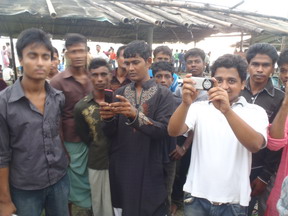 | 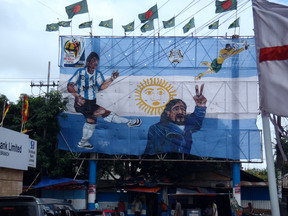 |
Next morning we headed on to Rangamati. We had a bit of a scare just as we left as the hotel manager suddenly checked that we had the necessary permits - what permits??? Apparently he was sure to go to the Rangamati area (and other surrounding tribal areas) as foreigners we needed a permit. There has historically been some unrest between the indigenous tribal people and the government forces and the official word is that this places foreigners in great peril and they need a permit so that the powers that be know where they are. This threw us into a bit of a spin in case they would turn us back, so we headed off to the DC (Divisional Commissioner's) office where apparently you can get said permits. We finally found it (no signs in English) and they looked at us blankly clearly not having a clue what we were after! Eventually they told us to go and see the DC once we reached Rangamati -another way of saying "go away so you're not our problem" really!
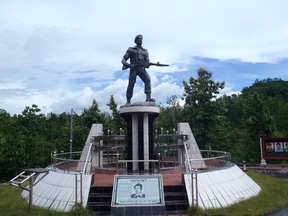 | 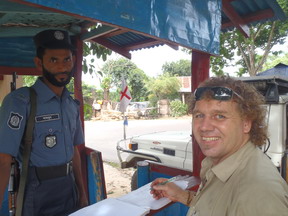 |
So on we drove away into another lush green landscape. On the way into Rangamati town we saw a war memorial with a great mosaic and a tribute to one particularly brave soldier who "embraced martyrdom" in a big battle which took place here in the 1971 war.
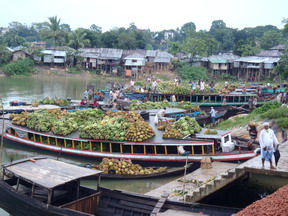 | 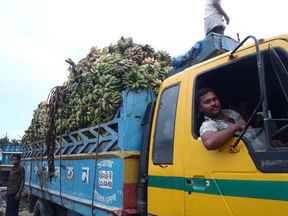 |
Rangamati is a great little spot. There was a real bustling market air as we drove into town with boats laden with produce - mainly bananas and jackfruit - were brought from settlements up the river and loaded onto waiting trucks to head to the markets of Dhaka and Chittagong.
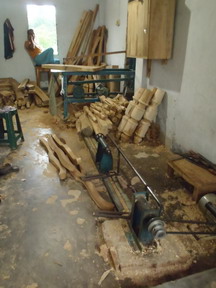
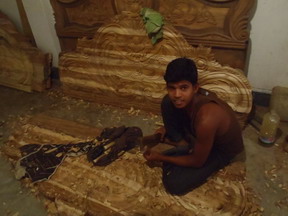
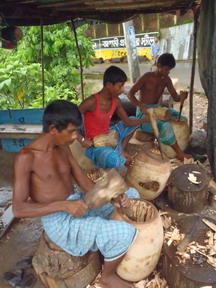
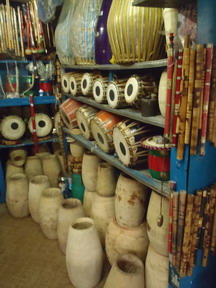
There are also numerous craftsmen at work - largely making wooden musical instruments and furniture.
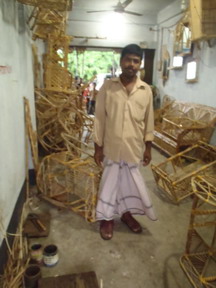
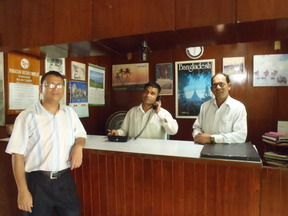
The village is set on the Kaptai Lake which was formed by damming the Karnaphuli River in 1960 by the Pakistan government (Bangladesh was still East Pakistan at the time.) It is incredibly scenic -but you have to remember this certainly wasn't a popular decision for everyone. A lot of the ethnic tribes (11 exist in the area, around the lake they are mainly of the Chaka tribe) were misplaced and feel they have never been adequately compensated for this by the government. This has historically been the cause of much unrest and fighting and is the reason for this nanny -like treatment of foreigners
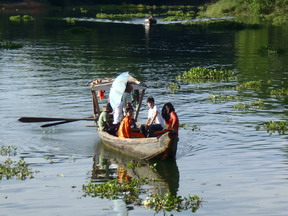 | 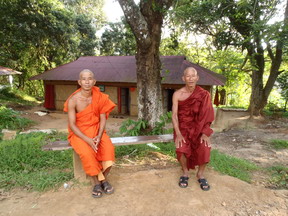 |
Talking of which on the outskirts of town we had had to stop at a small booth where we gave in our details to a policeman. We then headed to the Rangamati DC office as promised. They were very kind and gave us tea but clearly hadn't a clue what to do with us - they kept asking us if we had permission from Chittagong DC - when they had told us we should get it there in Rangamati DC! They eventually made us write out what we wanted to do on a piece of paper which they kept. By this time we'd got the drift - as long as we didn't hassle anyone it was easier just to keep moving. So if they said "Do you have permission" as long as we said "Yes" confidentially enough they let us go!
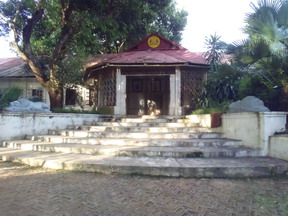
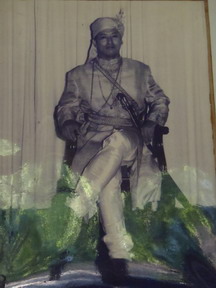
As the afternoon sun was dropping we headed to the river and caught a little commuter boat onto the small island on the lake which houses both the Raja Vihara or King's house of the local indigenous Chakma King (his original palace has been underwater since 1960) and a small Buddhist monastery. The Chakma people remain Buddhist, unlike many tribal groups who have been converted to Islam or Christianity and it's really nice to see the monk's robes around again.
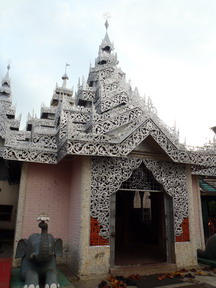
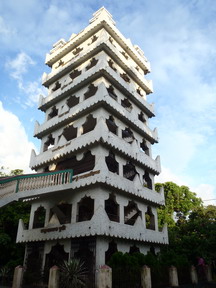
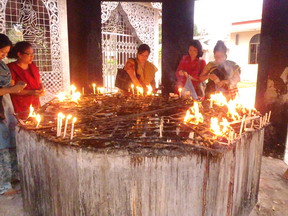
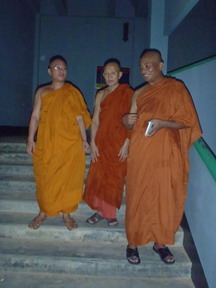
We then took the little boat across to a neighbouring island which housed the Bana Vihara temple. We wandered around and saw a "7 stages to heaven temple" (with a dog which had reached number 2!) and various shrines until we were lucky enough to be "adopted" by a monk who was in fact a Colonel in the Bangladesh army having some "monk time" out of his real life as Buddhists often do.
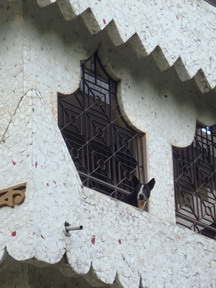
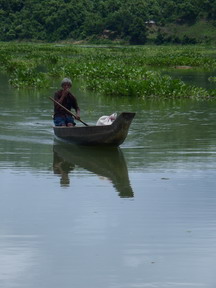
He had been to Darwin and spoke very good English. We were ushered into the presence of the old Head Abbott a very revered figure of 90 years who is apparently a Buddha. They are a different branch of Buddhism to the Tibetans so the Dalai Lama isn't so revered here - he was dismissed a bit as a "political figure" when I asked about this - and was we were not told not a Buddha as this man is. Anyway people journey for great distances to meet the Abbott so we were honoured to be introduced.
We headed over on the boat - just missing the rain - to catch the Tribal Cultural Institute Museum. Sadly no pictures allowed but there was a lot of interesting information about the different tribal groups - a huge variety exists. Hopefully these unique cultures will survive into the next century.
The heavens then opened and in the driving rain we drove around to find somewhere to stay - not easy in the dark as the area is a confusing jumble of interconnecting roads over the water. Eventually we found the government run Parjatan Motel (see picture of the staff in reception above) - a lovely old hotel set picturesquely on the edge of the lake. We were very fortunate also to meet a very charming Irishman Gerry over here working for the UN and with typical Irish hospitality he treated us to a couple of beers - a real treat was us, thanks Gerry!
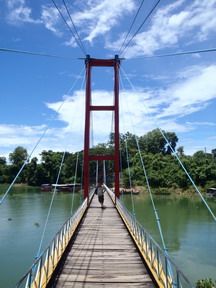
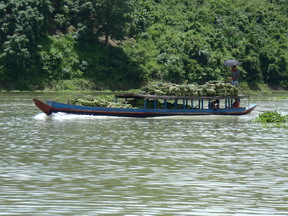
Rangamati was a great spot - one of the nicest we've seen here to date. The next morning we had decided to do the essential thing in Rangamati - a trip on the Kaptai Lake.
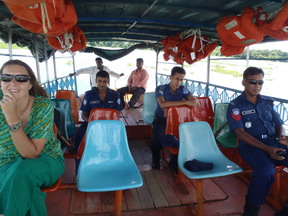 | 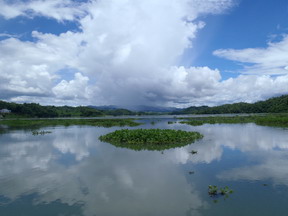 |
So off we set - all 7 of us! That's me and Andrew, the boatman, a second boatman/guide from the hotel and 3 policemen -all fully armed!!
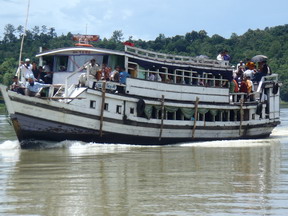
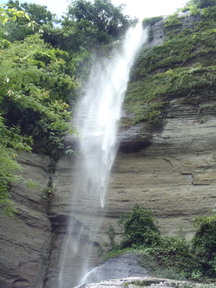
As mentioned before Bangladesh is likely to be the only time Andrew & I are ever likely to feel like celebreties - first the staring, then the excessive photos and now - our own security force!!
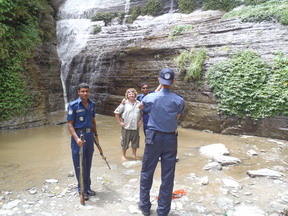 | 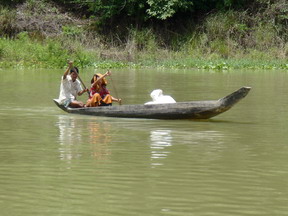 |

We visited a scenic waterfall and then onto a Chakma Village. We met the local English teacher in his traditional bamboo hut. He seemed to be friendly with the police and chattered away to them but when we spoke to him he definitely harboured dark feelings about the government who had flooded them out of their way of life. He said that the Peace Agreement - brought in in 1997 to recompense the tribal people - had not yet been fully honoured. We certainly didn't feel that he was any threat to us though as he and his family served us tea!
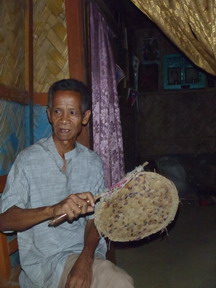
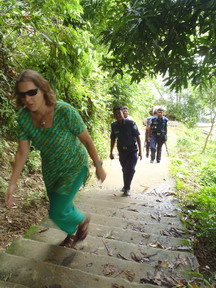
Back on the Lake we motored around a bit more - really beautiful we highly recommend it - before stopping for lunch.
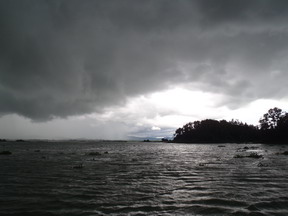 | |
As we tied up the boat the heavens absolutely opened so we were completely soaked when we staggered up to the little lunch hut. This was full of locals when we arrived but they very swiftly disappeared - we don't think it was us -just turning up with a full police guard in this way probably isn't the last word in cultural exchange! We had a delicious meal of chicken in bamboo - all 7 of us!! When travelling with a local guide /boatman it is the general rule if there is a meal break you pay for their food. Having to do this for 7 people was a bit of a budget stretcher!
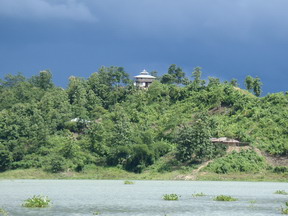
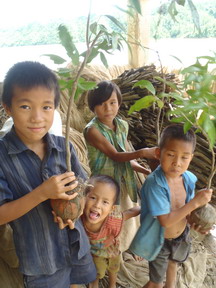
We loved Rangamati and would really recommend it - the birds and butterflies were gorgeous as was the scenery. We really felt we could miss out on the police guard though - friendly though they were!! We did have thoughts of sneaking out without them but apparently this would get the boat driver in big trouble if discovered so wasn't really fair.
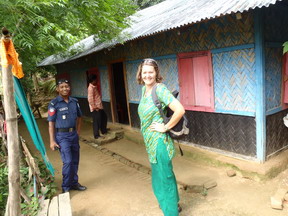 | 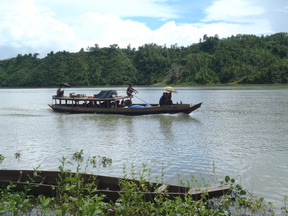 |
On we drove through an increasingly hill terrain. On the way we stopped off at Chitmorong a small village with a monastery set picturesquely on the opposite side of the river so we had to cross by commuter boat.
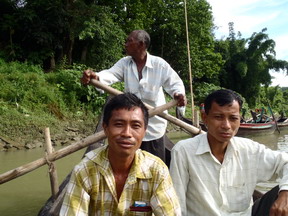 | 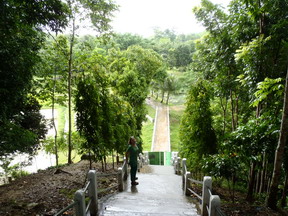 |
We walked up the steep steps to the monastery and met with some pilgrims monks all of whom were friendly but none of whom spoke any English.
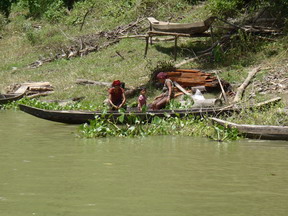 | 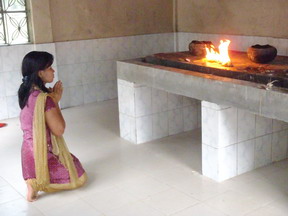 |
Dodging the showers we headed back, and on the way we were invited in for a glass of rice wine by a very friendly local. More like vodka this clear liquid is pretty potent- especially in the morning so we refused the offer of a second glass!
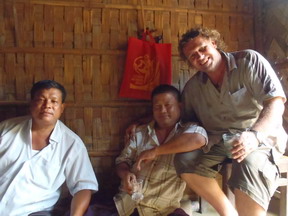 | 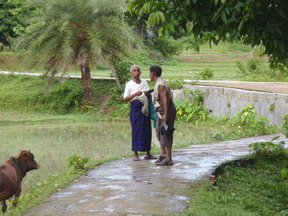 |
These people are from the Marma tribe - originally from Myanamar. They remain Buddhist hence the monastery. They were very friendly and welcoming but it was true there is some undercurrent of resentment aimed at the government who they feel treat them as 2nd class citizens. Apparently there is a Marma community in Newcastle- the Aussie one- of all places- so they would have been our neighbours when we were living on the Hawkesbury. Really lovely people.
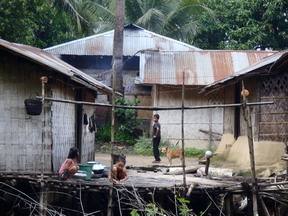 | 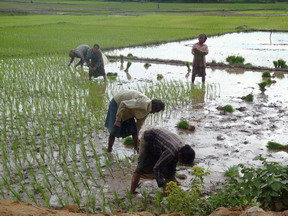 |
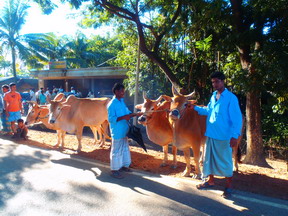
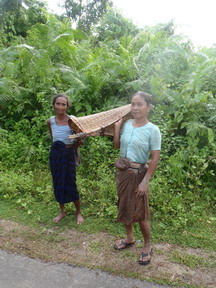
We had to cross a river by car ferry on the way and we passed some local kids having great fun. They were taking off their clothes (to keep them dry) and stashing them underneath the ramp before and sliding down on the slippery wet surface having a ball. Who needs leisure centres!!
This whole area was the scene of an insurgency in 1973, which the government countered in 1979 by giving some of the tribal land to Bangladeshi Muslims who were encouraged to settle here so they are now as strong a presence as the indigenous people. The situation seems to have settled now (though there is an understandable undercurrent of resentment re: all this) and all seemed calm though the town has a big police presence.
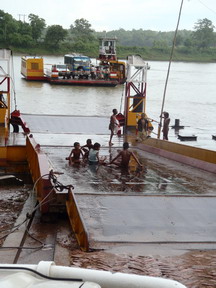
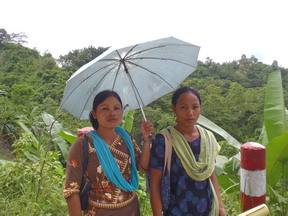
We didn't really have the time for a trek and it was very wet and slippery for my bad feet, and furthermore we didn't fancy being tailed by (and having to feed!!) 3 guards as is required, so we just had a look around the town. We found a little hotel in town (we had had the Hillside Resort in a great location out of town recommended but when we fronted up to was a bit pricey for us) and had a good night's sleep.
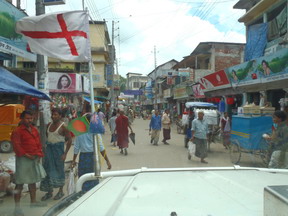 | 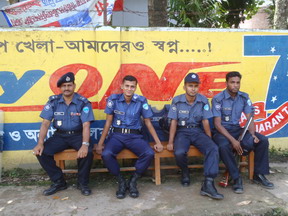 |
Next morning was Wednesday and for once we'd timed it right to hit the tribal market in town. Most of the business here is conducted in Marma rather than Bengali though there are Bangladeshi traders. It was a really gorgeous colourful market one of the best we've seen -and by now we're veterans of the Asian market scene!!
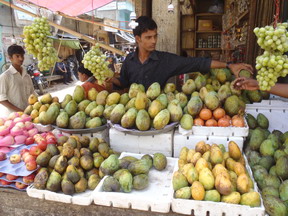
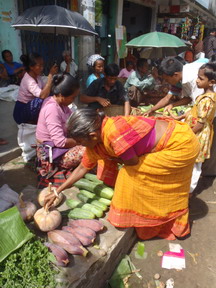
The tribal people look very different having flatter Burmese faces and being beautifully adorned with unusual bangles/ earrings. A lot of the ladies smoke - either pipes or big cigars which looks a bit different for us! They are very attractive people with gorgeous high cheek bones.
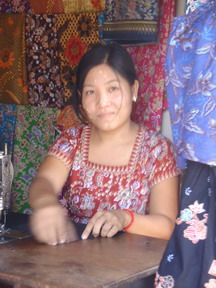
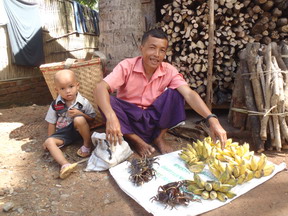
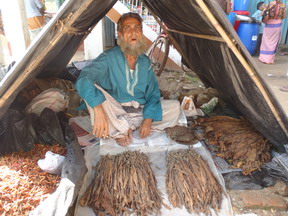
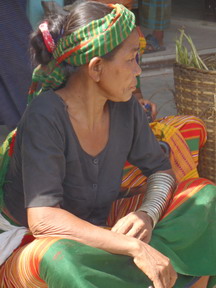
We also saw a lot of people from nearby Myanmar, the ladies with their distinctive golden face paint.
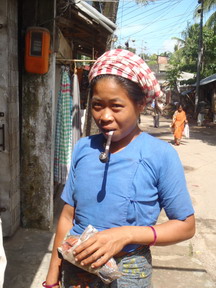
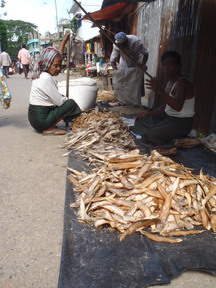
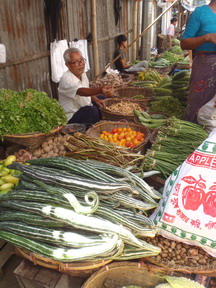
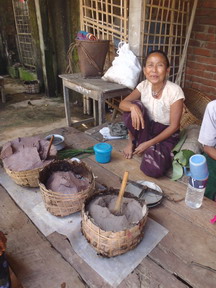
They were selling everything - fruit of all kinds, fish, fish paste, turtles (not so good that one!) and intricately woven fish traps to name a few things.
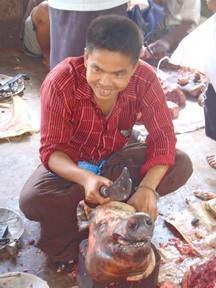
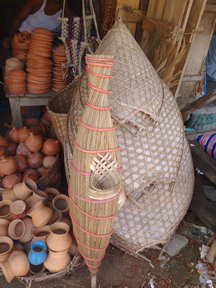
Banderban would have been a great place to stop for a few days but once more we have our eye on the clock so we headed on that day.
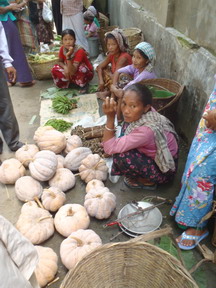
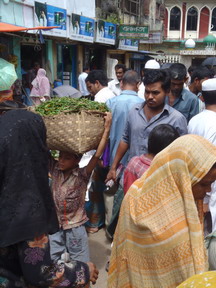
First we saw a couple of local attractions. The Tribal Cultural Institute Museum was hard to find and somewhat understated, they had to open it up for us and it didn't look like it saw many visitors though there was some good silver jewelry and a portrait of the late Chakma King.
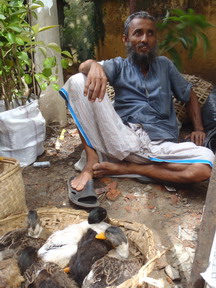
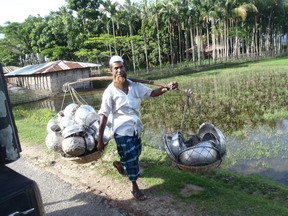
We then went along to see the house of the current King - the Bohmong Rajbari. We had understood from our LP that this was open to the public. When we arrived there were lots of people milling around and eventually a very nice young man Jesse came and told us his grandpa (the King) was sick and so couldn't meet us. We'd almost walked straight into the house thinking it to be a museum so were pleased we hadn't ! Now 95 the King must have seen some changes in his life. Jesse, pictured outside the royal house with his young cousin is off to study in Huddersfield shortly. Not sure if that's a fitting spot for royalty really!
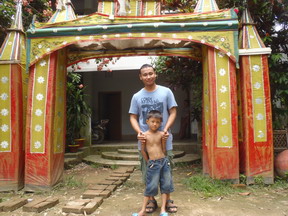
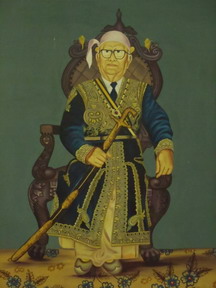
Leaving Banderban we stopped off for one last time to see the Golden Stupa a Buddhist temple up a steep stairway - it started to pour down once we were half way up so we were very wet on arrival. It was a lovely view and a nice golden stupa very like those we'd seen in Myanmar. We got to peer inside the main stupa but not enter (shame as it'd of kept the rain off!) which is unusual for Buddhism they're usually extremely welcoming to everyone and no areas are "off limits."
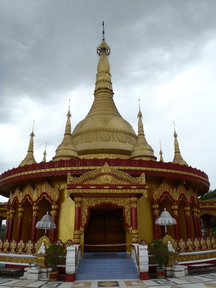
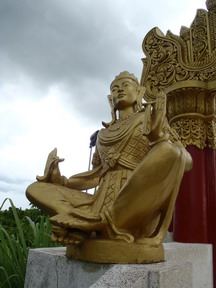
We drove on to arrive by early evening in the seaside town of Cox's Bazaar. Cox was a Britisher as they say here - posted in Myanmar when this was all one empire. He used to like coming here and somehow the town got named in his honour - they don't make much of this history so we discovered little else. CB is unlike any other part of Bangladesh and it was lovely to see the ocean again. CB seems to hold a mystical type of attraction to the Bangladeshis here and wherever we go we are asked if we've been there, so at least now we can finally say yes!!!
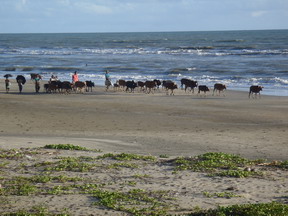 | 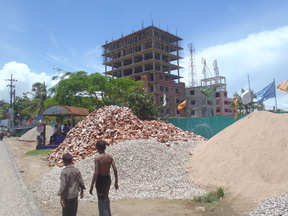 |
CB is actually a lovely beach despite the development going on. No doubt Cox must be rotating in his grave!! The beach front has more huge characterless hotels than you'd think possible and a lot of the beach front building looks like it's on reclaimed land and might sink back at some stage! The centerpiece in town was a fibre glass model of a shark advertising the opening of the new shark statue - which sadly we missed!
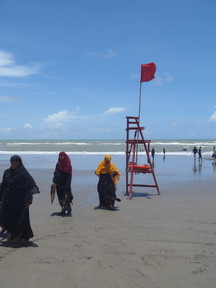
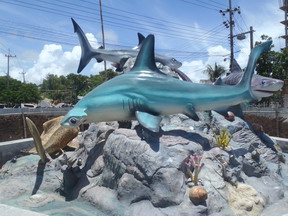
However you certainly felt the enthusiasm of the Bangladeshi holidaymakers here which gave the town an upbeat atmosphere. Not a great spot for western tourists as yet - no way you'd wear a bikini here- everyone kept well covered on the beach. It being low season, and with the surfeit of accommodation here it was a good time to snag a bargain and we stayed at the characterless but perfectly comfortable government hotel. We saw a gorgeous sunset and felt revigorated by the sea air for the first time in ages.
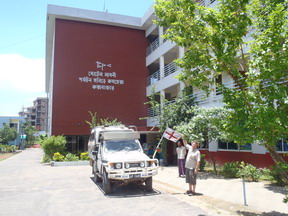 | 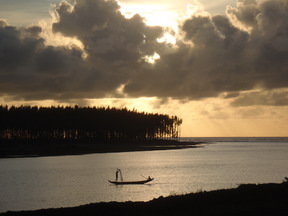 |
Surprisingly CB is a bit of a surfing centre, though sadly we missed it as it's not on until September. In September there is a surfing contest which (jaw drops in amazement) actually has a women's section!!! What do they wear we wonder can't imagine surfing in a wet salwar kameez which is what they all swim in here. Good on them though!!
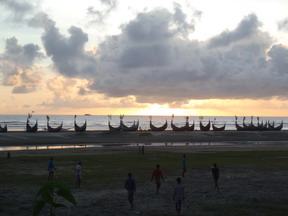 | 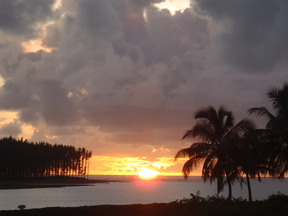 |
Next day we headed out of town towards Teknaf 92km to the South and the Southernmost tip of Bangladesh just next to Myanmar. On the way out we drove along the beautiful Himachari and Inani beaches. This area is far more scenic than CB town, very unspoilt all palm trees and local villagers' bamboo huts. Inani beach is actually the big claim to fame of the region being the world's longest and broadest beach so they say.
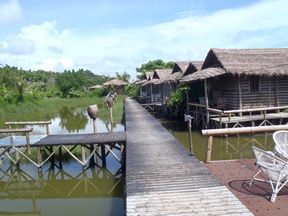 | 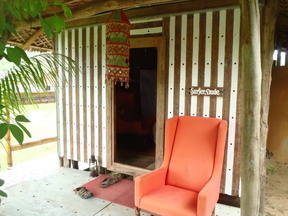 |
We stopped off at the Mermaid Eco-resort to get have some lunch which turned out to be a very good move. Totally powered by solar and wind power and built using recycled materials (many recovered from the Chittagong Ship breakers of which more later) this superb resort lives up to its name. We enjoyed a really delicious fish lunch and were just about to head off when the owners and management team came and said hello and were really interested in our trip. Amazingly they offered us a free night's accommodation in their luxury resort which we were very keen to accept!! The resort has 26 individual bungalows all imaginatively named - we stayed in "Surfer Dude" which Andrew was very pleased about! It is the most relaxed chilled out spot - you really don't feel you're in Bangladesh.
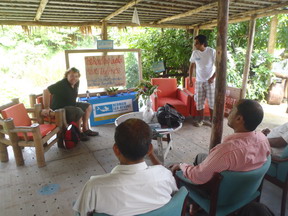 | 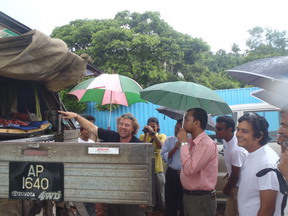 |
 On we drove to Teknaf a pretty route, just dodging the odd precarious looking telegraph pole being erected! Once we hit Teknaf - after the usual police check point - we came to the Teknaf nature reserve which allegedly has wild elephants still - though we think you'd be lucky to spot one.
On we drove to Teknaf a pretty route, just dodging the odd precarious looking telegraph pole being erected! Once we hit Teknaf - after the usual police check point - we came to the Teknaf nature reserve which allegedly has wild elephants still - though we think you'd be lucky to spot one.
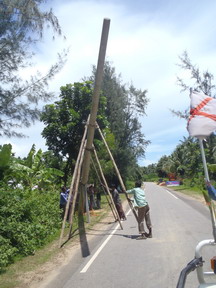
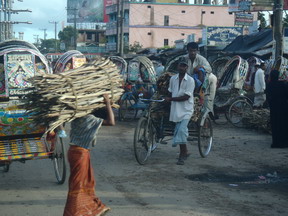
Teknaf has a bit of a "border town" feel and the views out over the hills of Myanmar are very scenic. You can't cross into Myanmar, and as rumour has it the lovely Junta government has planted minefields on the way in, it's best not to try. The CB area actually has a large refugee camp containing victims of the various persecuted people who have escaped from that poor country.
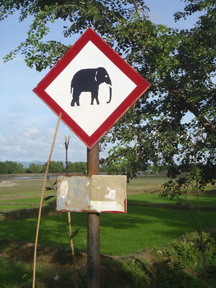
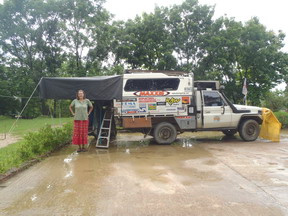
We found a camp spot at the government hotel just as the heavens opened. Somewhat damply we reverted back to camping as the accommodation here is in very short supply and thus over priced though they can't see a lot of tourists.
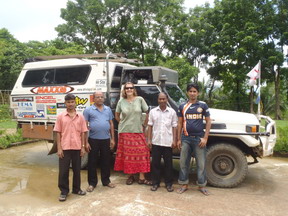
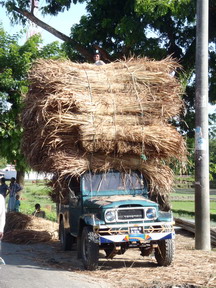
The main reason people visit is to catch the boat to St Martin's Bangladeshi's only coral island which is supposedly very beautiful but the boats don't run during the monsoon. Some local fishermen offered to take us over but there was no guarantee we could get back if the weather were to change and so we decided to leave it for this trip. The water quality and visibility wouldn't be great at this time either.
 We took a walk along the nearby beach and looked at the gorgeously painted fishing boats. They don't have an "off season" here like India and the boats still go out though the monsoon which must be scary stuff. Afterwards we went as far south as you can in Bangladesh (meaning we've now been to all four points) to the little village of Shahpuri. We walked down the jetty to look at the hills of Myanmar just across the water.
We took a walk along the nearby beach and looked at the gorgeously painted fishing boats. They don't have an "off season" here like India and the boats still go out though the monsoon which must be scary stuff. Afterwards we went as far south as you can in Bangladesh (meaning we've now been to all four points) to the little village of Shahpuri. We walked down the jetty to look at the hills of Myanmar just across the water.

There was a bit of high drama whilst we were there as there was a ship load of buffaloes that had just come across from Myanmar being unloaded.
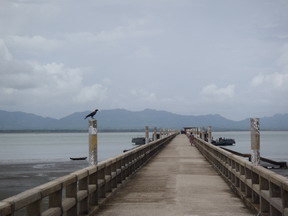
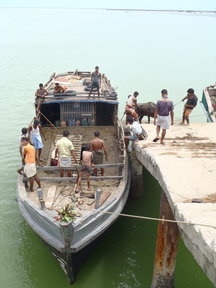
A couple had broken free and there was a great deal of commotion with people flinging themselves out of the way - we didn't realize what had happened or that the buffaloes had escaped and just walked straight past them to the horror of everyone! We survived and the buffaloes were recaptured and lead to greener pastures so a happy ending!
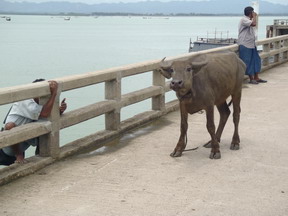 | 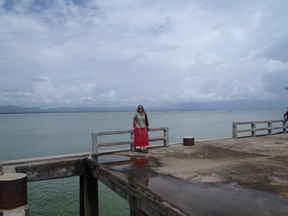 |
We headed back to CB - and had a final fresh fish lunch at a beach restaurant overlooking the waves before once more waving the sea goodbye - until Pakistan or Iran probably!
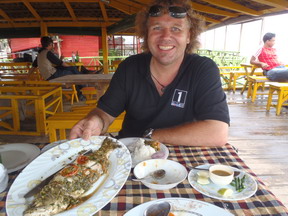 | 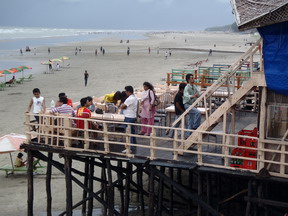 |
We stopped at a road side car washers to get the damaging salt water washed off the underside of the car and were assisted by a team of very enthusiastic young car washers who crawled all over the car getting into every corner!
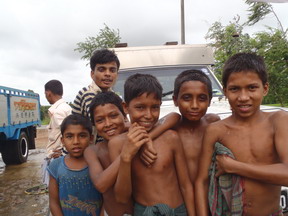
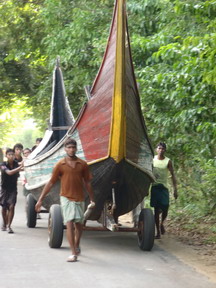
We drove back the 4 or 5 hours to Chittagong partly to break up the long drive back to Dhaka and partly because Andrew was very keen to see the ship breakers who operate out of here. Like Gujarat in India Bangladesh is a big centre for ship wrecking with many yards operating out of Chittagong. Also like India Bangladesh has had bad press from Westerners - particularly Greenpeace - who argue that these yards pose a threat to public health the environment and the workers - and thus it is virtually impossible for foreigners to get in to see them.
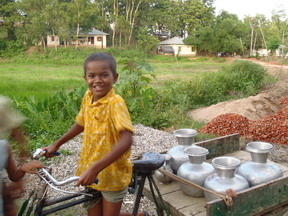 | 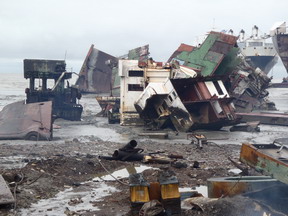 |
We had tried and failed in India but in Chittagong previously, just prior to leaving, we had had a chance meeting with a young man who used to work in the yards and said he could get Andrew in. I decided to give it a miss, thinking I'd be very conspicuous and the next morning Andrew headed off with his guide, and after paying the customary "baksheesh " to the gate guards was let in. The huge ships from all around the world take over 3 years to build but just 3 months (with teams of 100 workers per ship working 7 days per week) to break.
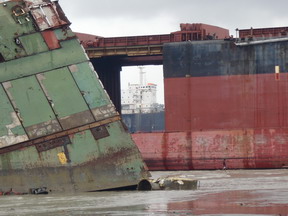
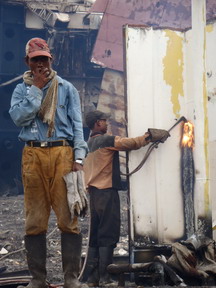
It must be very hard dirty work and there are often accidents. Andrew's guide talked of a recent one when 7 young guys died due to a gas explosion, which is particularly awful when you hear that some of the workers are kids of just 12 years old. However in a country as poor as Bangladesh there is a real resentment of outsiders who try to stop them earning what is seen to some as good money - 5,000 BDT or around $85 Aus a month. Maybe the answer is for Greenpeace et al to try and improve the conditions by introducing OHSS guidelines rather than shut the whole thing down. It was a very toxic environment when the steel was cut and Andrew was pleased to get out of there. A very interesting experience for him though.
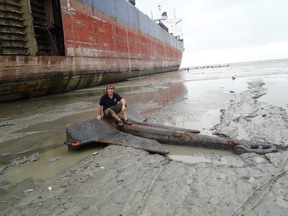 | 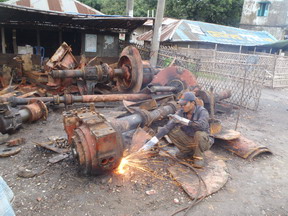 |
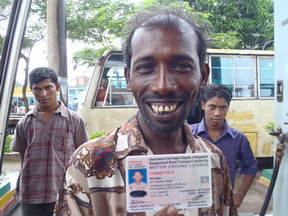 | 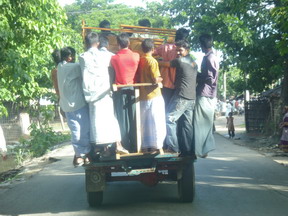 |
As mentioned previously we had been very worried when we first entered Bangladesh as to whether we could get another 6 month visa back into India as this office usually doesn't grant them to foreigners. We went to see them and after a meeting and a nervous day waiting around we phoned to be told that yes in our "special circumstances" this would be ok. We knew an Indian visa runs from when it is issued to we decided to leave it until the end of our trip before applying which is what we were doing here. Imagine our delight when we were now told that this office only issues short term visas. The man we saw before had now left the job and all our paperwork which we had meticulously filled in copied and filed was missing so we had to re-apply from scratch with no guarantee of success. WTF!!! This means we will have to go back to Nepal sooner than planned and do battle with their Indian visa office in order to (maybe) get another 6 months visa. We can't seem to get these people to see that with a car it is really hard we can't pop in and out of borders, we need time to drive these distances. You'd think they'd want to encourage long term tourists - we are spending money and on our website we try and show what a great place to visit India is. Why then do they make it so bloody difficult for us to get visas??? The stock answer is terrorism which is a major concern for everyone but I can't see the relevance - we've already had 2 months out of the country due to the new rule - and still we may only get a measly month's visa. Not much we can do about it though.
So as I type (Tuesday 13 July) we are having a day of car (Andrew) and website (me) maintenance. We have to pick up our visa on Monday 19th at 4pm which make it a bit of a rush to cross the border back to India the next day but we've no choice. We plan to head off from Dhaka tomorrow and spend the next few days down south in Mongla in the Khulna division, maybe even fitting in a boat trip to the Sundarbans to do some tiger spotting.

